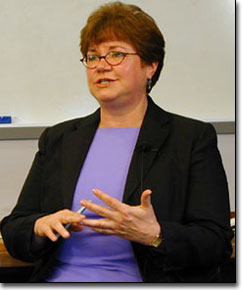


Stage 1 - Investigates Photo
Related IssueFaye Bowers: The Editor's Story

Her smile makes everyone feel comfortable in an instant. David Rohde has described her as "maternal" and "very supportive." But her work demonstrates that Faye Bowers, deputy world editor of The Christian Science Monitor, is tough-minded, fiercely protective of her writers, and tireless in her efforts to make the paper's international coverage world-class.
Bowers had known David Rohde at the paper for six months before he left for former Yugoslavia as a correspondent. The two had a good editor-writer relationship, which was to be a crucial foundation in the difficult days ahead.
Once Rohde was in the Balkans, he was in daily contact with Bowers when circumstances permitted. "Long, long conversations," recalls Bowers. "Sometimes three times a day, twenty-minute calls." But they often talked in code, fearful that the Serbs had tapped their phones and e-mail connections.
Faye Bowers discusses her role in helping David Rohde investigate teh suspected mass graves in Bosnia during Professor Anne Nelson's International Reporting Class at Columbia University. Photo: Ian Wilhelm
As Rohde discovered a growing body of disturbing evidence -- bones, blood and the testimony of survivors of mass executions -- Bowers was an engaged listener, lending him the psychological support reporters often need under such pressure.
Bowers arrived at her position through an unlikely path. She previously served as a social worker, and once owned a flower shop in Arizona. She came to The Monitor in 1988 as an executive assistant to the editor. Occasionally, she would write sports features for the paper, mainly about baseball and tennis games, because it allowed her to spend time with her then-teenage son. But she found international journalism contagious, and began to study international affairs part-time, receiving her bachelors degree from Boston University. In 1991 she began editing in the foreign news department. She began writing on national security and social issues in 1995.
The Christian Science Monitor is a Boston-based daily with a circulation of about 80,000, mainly by mail subscription. It receives support from the Christian Science Church, but does not promote it. Its readership is national, highly educated, and with a strong interest in social issues. Because most readers receive the paper a day after publication, Monitor stories tend to focus on trends and analysis.
With less pressure to cover spot news, Bowers could afford to give Rohde three weeks to look for Srebrenica survivors.
"I always go for the story that nobody else is covering," she said. "We were thrilled to keep on it. We had a responsibility to cover all that was happening and David was on it."
Once a reporter is on the trail of an investigation in a remote location, an editor can be drafted into a multiplicity of roles, ranging from strategist to research assistant. Bowers located and faxed Rohde the copy of the satellite map that led him to the gravesites in Serb-controlled territory the first time. She was also the first person to share the results. Rohde called her from a public phone, saying: "'Save a place on the front page, Faye. I have a femur,'" she recalls. "I never had doubts. I felt that David had really nailed it."
Bowers' friendship with Rohde made it easier for her to trust his findings in the field. But it may also have heightened her worry and concern for his safety. The Serbs had officially forbidden Rohde to re-enter the territory under their control. Believing that Bowers would disapprove of him returning, Rohde took advantage of the six-hour time difference between Belgrade and Boston and e-mailed her a message. He described where he was going, what he was doing, and asked her to call his friend if he did not return by a certain time. The e-mail was dated Sunday evening. Bowers read it at 6:30 a.m. Monday morning.
Bowers had been puzzled by Rohde's uncommunicative behavior before he left. "I thought David was mad at me," said Bowers. "But, I knew how important it was for him to tell the story, so I am not surprised he went."
By Monday, with no word from Rohde, Bowers had a difficult task: to inform his family that he was missing. She called Rohde's brother, who told the rest of the family. They all arrived at the newspaper's office to discuss his situation.
Five days passed and there was no word from Rohde. Bowers said she slept only two hours a night until it was confirmed that he was missing -- an eternity of 120 hours.
By Friday, Bowers, Clay Jones (the Monitor's foreign editor), and Rohde's family went to Dayton, Ohio, where peace talks were underway. They lobbied the officials to do everything possible to secure Rohde's safe release. Through a twist of fate, the journalist had become the story, and the editor had become his advocate in yet another sense.